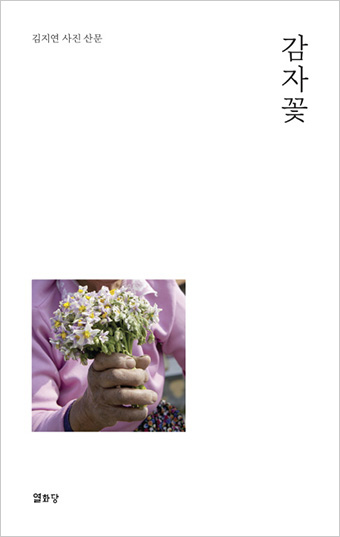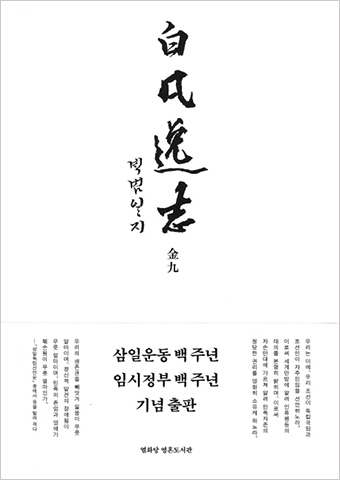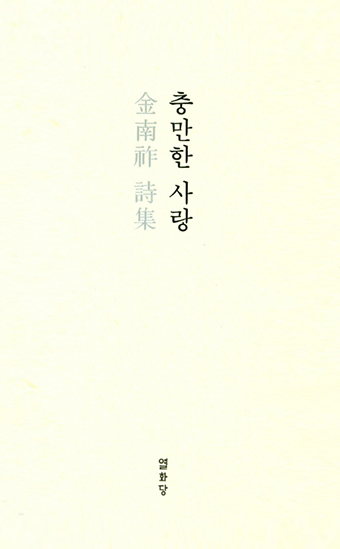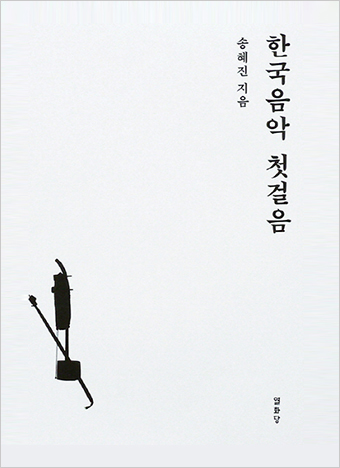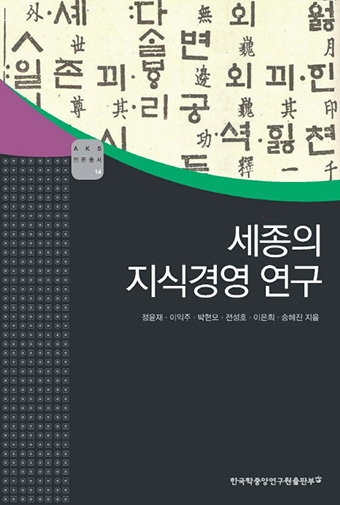|
Export Prospects of Korean Books Export Prospects of Korean Books KPIPA’s Choice for Supporting Abstract · Sample Translation
2019.08.05
From Poetry
1. Publication Details Imprint | SANZINI
2. Contact Name | Kang Sugeul
3. Marketing Information Keyword | Poetry; poet; writing; poetry theory; essay
4. About the Author Kang made his literary debut in 1986 at the Hankook Ilbo Daily Spring Literary Competition. His published poetry anthologies include It’s drying up. It’s scattering, Rolled up, I sent a Gumjeongsan, Poke at, Whistle, Shadow Lake, and Sunbathing Furniture.
5. About the Book In a world where usefulness has become society’s top priority, poets are called to rise up and challenge utilitarianism as a way of life. Kang Sugeul reflects on his experiences in this ode to the art form that sustained him physically and emotionally for three decades.
Potato Flowers
1. Publication Details Imprint | Youlhwadang
2. Contact Name | Yi Soojung
3. Marketing Information Keyword | photography; travel; essay
4. About the Author Born in 1948 in Gwangju, South Jeolla Province in South Korea, Kim Jee Youn is a photographer and an exhibition manager who is interested in archiving and shedding new light on the development of the modern history of Korea. She studied Drama at the Seoul Institute of the Arts and went on to receive a degree in English Literature from Korea National Open University. Kim currently serves as Director of Gyenam Jungmiso Community Museum in Jinan, North Jeolla Province and runs Seohak-dong Photography Lab in Jeonju. Previously, she held solo exhibitions under the titles Jungmiso (2002), Modernization Store (2010), and Ancient Room (2012), and organized numerous exhibitions including People of Gyenam Village (2006) and Bundle (2012). Her publications include photo collections Jungmiso’s Heritage (2013) and Standing in an Empty Room (2015).
5. About the Book Kim Jee Youn’s previous solo exhibitions featured old every day images such asan elderly lady with her hair in a neat bun sitting alone in a decrepit room, a grave surrounded by basalt fences on Jeju Island with the sea in the background, a worn-out barbershop signboard with a few missing letters, and a rice mill with a deep green roof. What does the author try to convey through such scenes? As her nickname “archivist” implies, Kim holds an ardent wish to pass on fond and affectionate memories to future generations.
Atelier of the Riverside
1. Publication Details Imprint | Youlhwadang
2. Contact Name | Yi Soojung
3. Marketing Information Keyword | art; design; essay; contemporary Korean art
4. About the Author and Illustrator Born in Yeon-gi, North Chungcheong Province in South Korea, Chang Ucchin graduated from Yangjeong High School and studied Western art at Teikoku Art School (now Musashino Art University) in Tokyo, Japan. After Korea’s liberation from Japanese colonial rule in 1945, Chang began working at the National Museum of Korea. During the Korean War, he served as a painter for the military. From 1954 to 1960, he taught in the College of Fine Arts at Seoul National University. He was thrice appointed a judge for the National Art Exhibition of the Republic of Korea, and held numerous solo and group exhibitions.
5. About the Book Contemporary artist Chang Ucchin presents on canvas images like trees, the sun, the moon, children, magpies, and villages with quintessentially Korean sentiments, creating his own unique artistic world in the midst of that simplicity—drawing oil paintings and using a wide range of materials such as marker pens, ink sticks, ceramics, silk screens, copper plates, and wood blocks. First published in 1976, the pictorial essay collection Atelier of the Riverside is the only collection of writings by this ingenious artist who has long enjoyed popularity among readers in Korea.
Baekbeom Ilji
1. Publication Details Imprint | Youlhwadang
2. Contact Name | Yi Soojung
3. Marketing Information Keyword | history; autobiography; education; literature; independence movement
4. About the Author and Illustrator Kim Koo (1876–1949), also known by his pen name Baekbeom, was a Korean nationalist politician and a leader of the Korean independence movement against the Japanese Empire. He joined the Donghak Movement, a rebellion against the state and foreign oppressions in 1893. Later, he fled to Manchuria and established the Korean Liberation Army. After the March 1st Movement in 1919, he exiled himself to Shanghai, China, where he later became the president of the Provisional Government of the Republic of Korea in 1927. Following Korea’s liberation from Japan’s colonial rule, Kim committed himself to establishing a unified and autonomous government in Korea. He was assassinated in 1949.
5. About the Book The first edition of Baekbeom Ilji was published in 1947, two years before Kim Koo’s death. Unfortunately, the book had an unfortunate beginning as the original text had been significantly tampered with, consequently erasing much of the author’s voice and diminishing the vividness of his descriptions of some of the most intense moments during the independence movement that took place in Shanghai and Chongqing, China. Not only was Baekbeom’s idiosyncratic, rugged style of writing embellished, but also some of the names of people and places were mistaken and extensive passages omitted. As a result, the first edition is still judged to be the most unfaithful text to the original.
Fullness of Love
1. Publication Details Imprint | Youlhwadang
2. Contact Name | Yi Soojung
3. Marketing Information Keyword | Literature; poetry; education
4. About the Author and Illustrator Born 1927 in Daegu, North Gyeongsang Province, Kim Nam Jo graduated from the Department of Korean Literature at the College of Education in Seoul National University. He made his literary debut in 1950 on the Yeonghap Newspaper with a collection of poems including “Constellations” and “Afterimage,” and published his first anthology Life in 1953—the first of eighteen poetry anthologies in his career. Kim has also been published in multiple award anthologies. In 1997, he released a collection of vignettes titled Beautiful People. Kim is the recipient of the Korean Poets’ Association Prize, the Seoul City Cultural Prize, the Korea Arts and Culture Prize, and the Manhae Prize. Currently, he is a professor emeritus at Sookmyung Women’s University and a member of the National Academy of Arts.
5. About the Book “You have lived ninety years / The clock says / I reply, I know // The clock asks, / What is your wish? / I reply, / An ego born of my heart / And effort to do my best / But a moment passes / And I change my reply / Love, wealth / And longevity // Bursting into laughter, the clock says: / From the most worldly of men / I expected no less... / Without rest, the clock / goes and waits”(“Clock” by Kim Nam Jo)
An Introduction to Korean Traditional Music
1. Publication Details Imprint | Youlhwadang
2. Contact Name | Yi Soojung
3. Marketing Information Keyword | music; performing arts; education; traditional culture
4. About the Author Song Hye-jin majored in gugak at the College of Music at Seoul National University and received both her master’s and doctoral degrees from the Graduate School of Korean Studies at the Academy of Korean Studies. Previously, she was a visiting scholar at Durham University, UK and an academic researcher at the National Gugak Center and served as the Artistic Director of Sookmyung Gayageum Orchestra. Currently, Song teaches in the Graduate School of Cultural Heritage Arts at Sookmyung Women’s University in Seoul, Korea.
5. About the Book This book is an abbreviated introduction to the traditional music of Korea, offering brief explanations of the history and branches of gugak, as well as an overview of the path that modern gugak has taken since the early twentieth century.
King Sejong's Knowledge Management Techniques
1. Publication Details Imprint | THE ACADEMY OF KOREAN STUDIES PRESS
2. Contact Name | Kim Wonki
3. Marketing Information Keyword | Management; Sejong; nation; knowledge; policy
4. About the Author Chung Yoonjae
5. About the Book King Sejong of Korea’s Joseon dynasty was known for his love of learning. With his insight and drive, he actively facilitated policy discussions with his advisors. This book uses written records from Sejong’s time to analyze the kind of knowledge the king applied in different contexts to govern the country.
|
Pre Megazine
-

Projects Supported by the KPIPA in the First Half of 2024
VOL.69
2024.04 -

Philosophy Changes Weather
VOL.69
2024.04 -

2nd Week, March 2024
VOL.69
2024.04 -

#Sky
VOL.69
2024.04 -

Agency list
VOL.69
2024.04 -

Surrender, Earth Creatures
VOL.68
2024.03 -

3rd Week, February 2024
VOL.68
2024.03 -

#School
VOL.68
2024.03 -

Killer-content Exhibition at the 2024 Bologna Children’s Book Fair
VOL.68
2024.03 -

Agency list
VOL.68
2024.03 -

Paik’s Korean Liquor
VOL.67
2024.02 -

4th Week, January 2024
VOL.67
2024.02 -

Minjeong Jeong
VOL.67
2024.02 -

#Start
VOL.67
2024.02 -

Agency list
VOL.67
2024.02 -

Hyeon Jeong Lee
VOL.66
2024.01 -

Agency list
VOL.66
2024.01 -

We Won’t Leave the Earth
VOL.66
2024.01 -

#Winter
VOL.66
2024.01 -

1st Week, December 2023
VOL.66
2024.01 -

My Time Does Not Flow Like Yours
VOL.65
2023.12 -

2nd Week, November 2023
VOL.65
2023.12 -

Konishi Naoko
VOL.65
2023.12 -

#Flower
VOL.65
2023.12 -

Wrap-up Summary of the 2023 Sharjah International Book Fair: Korean Pavilion
VOL.65
2023.12 -

2023 Korea Picture Book Award
VOL.65
2023.12 -

Agency list
VOL.65
2023.12 -

The Only One
VOL.64
2023.11 -

2nd Week, October 2023
VOL.64
2023.11 -

Yoojin Lee
VOL.64
2023.11 -

#Book Fair
VOL.64
2023.11 -

Sharjah International Book Fair 2023: Korean Pavilion
VOL.64
2023.11 -

Agency list
VOL.64
2023.11 -

Things I Couldn’t Throw Away Again
VOL.63
2023.10 -

2nd Week, September 2023
VOL.63
2023.10 -

Li Xia
VOL.63
2023.10 -

#Autumn
VOL.63
2023.10 -

Agency list
VOL.63
2023.10 -

The Baobab and the Snail
VOL.62
2023.09 -

2nd Week, August 2023
VOL.62
2023.09 -

Kang Bang-Hwa
VOL.62
2023.09 -

2023 Visiting Korean Book Fair in Paris
VOL.62
2023.09 -

Agency list
VOL.62
2023.09 -

#Photograph
VOL.62
2023.09 -

The Sound of Summer
VOL.61
2023.08 -

3rd Week, July 2023
VOL.61
2023.08 -

Slin Jung
VOL.61
2023.08 -

#Food
VOL.61
2023.08 -

Agency list
VOL.61
2023.08 -

Brilliant Regards
VOL.60
2023.07 -

2nd Week, June 2023
VOL.60
2023.07 -

HOANG HAI VAN
VOL.60
2023.07 -

#Life
VOL.60
2023.07 -

Titles Selected for the Overseas Publication Grants 2023
VOL.60
2023.07 -

Agency list
VOL.60
2023.07 -

Together, and There Shall be the Path
VOL.59
2023.06 -

2nd Week, May 2023
VOL.59
2023.06 -

XIAO ZHUANG
VOL.59
2023.06 -

#Dream
VOL.59
2023.06 -

Agency list
VOL.59
2023.06 -

I’m in Tongyeong
VOL.58
2023.05 -

2nd Week, April 2023
VOL.58
2023.05 -

2023 Visiting Korean Book Fair in Tokyo
VOL.58
2023.05 -

Moon Chakage
VOL.58
2023.05 -

#Love
VOL.58
2023.05 -

Agency list
VOL.58
2023.05 -

UN HE PAIK
VOL.57
2023.04 -

Joseon Art Museum
VOL.57
2023.04 -

2nd Week, March 2023
VOL.57
2023.04 -

#SF
VOL.57
2023.04 -

2023 Overseas Publication Grants
VOL.57
2023.04 -

Agency list
VOL.57
2023.04 -

Books Sotheby’s Loved
VOL.56
2023.03 -

3rd Week, February 2023
VOL.56
2023.03 -

Lee Tae-Yeon
VOL.56
2023.03 -

#Companion Animal
VOL.56
2023.03 -

Agency list
VOL.56
2023.03 -

Agency list
VOL.55
2023.02 -

Always Smile
VOL.55
2023.02 -

3rd Week, January 2023
VOL.55
2023.02 -

Helen Cho
VOL.55
2023.02 -

#Travel in Korea
VOL.55
2023.02 -

Killer-content Exhibition at the 2023 Bologna Children’s Book Fair
VOL.55
2023.02 -

2023 Future Science Trends
VOL.54
2023.01 -

1st Week, December 2022
VOL.54
2023.01 -

Sandy Joosun Lee
VOL.54
2023.01 -

#2022 K-Book Copyright Market
VOL.54
2023.01 -

Agency list
VOL.54
2023.01 -

The Age of Daughters
VOL.53
2022.12 -

2nd Week, November 2022
VOL.53
2022.12 -

VO THI KHANH LAN
VOL.53
2022.12 -

#Mystery & Thriller
VOL.53
2022.12 -

Agency list
VOL.53
2022.12 -

You’re Light
VOL.52
2022.11 -

2nd Week, October 2022
VOL.52
2022.11 -

Kaparushkina Diana (Jang Diana)
VOL.52
2022.11 -

#Library
VOL.52
2022.11 -

2022 K-Book Copyright Market
VOL.52
2022.11 -

Agency list
VOL.52
2022.11 -

Eun Hye’s Hug
VOL.51
2022.10 -

2nd Week, September 2022
VOL.51
2022.10 -

Kong Yuan
VOL.51
2022.10 -

#Self-Esteem
VOL.51
2022.10 -

Agency list
VOL.51
2022.10 -

Tube
VOL.50
2022.09 -

2nd Week, August 2022
VOL.50
2022.09 -

Alyssa Kim
VOL.50
2022.09 -

#Environment & Climate Change
VOL.50
2022.09 -

Killer-Content Exhibition at the 2022 Göteborg Book Fair
VOL.50
2022.09 -

Agency list
VOL.50
2022.09 -

Post-Mobility
VOL.49
2022.08 -

2nd Week, July 2022
VOL.49
2022.08 -

Ji-Hyun PARK, CELESTIN
VOL.49
2022.08 -

#2022 Visiting Korean Book Fair - Indonesia
VOL.49
2022.08 -

Agency list
VOL.49
2022.08 -

Titles Selected for the Overseas Publication Grants 2022 (Results)
VOL.49
2022.08 -

2022 Visiting Korean Book Fair in Tokyo
VOL.48
2022.07 -

It’s Time to Say Goodbye
VOL.48
2022.07 -

1st Week, June 2022
VOL.48
2022.07 -

Park Kyeong-Hee
VOL.48
2022.07 -

#Friendship
VOL.48
2022.07 -

Agency list
VOL.48
2022.07 -

Agency list
VOL.47
2022.06 -

Today’s Jaram
VOL.47
2022.06 -

2nd Week, May 2022
VOL.47
2022.06 -

Mi Hyun Kim
VOL.47
2022.06 -

#Picture Books
VOL.47
2022.06 -

Words Without Heart
VOL.46
2022.05 -

2nd Week, April 2022
VOL.46
2022.05 -

Jin Jin-Joo
VOL.46
2022.05 -

#Science - Children’s Books
VOL.46
2022.05 -

Seoul International Book Fair 2022
VOL.46
2022.05 -

Agency list
VOL.46
2022.05 -

Queen of Words
VOL.45
2022.04 -

2nd Week, March 2022
VOL.45
2022.04 -

Gi Jang
VOL.45
2022.04 -

#K-Webtoon Fantasy
VOL.45
2022.04 -

South Korea the Guest of Honor at the 2022 Bogota International Book Fair (FILBO)
VOL.45
2022.04 -

Agency list
VOL.45
2022.04 -

Winners of the 2022 Bologna Ragazzi Award
VOL.44
2022.03 -

Metaverse Sapiens
VOL.44
2022.03 -

2nd Week, February 2022
VOL.44
2022.03 -

Bae Yang-Soo (裵凉秀)
VOL.44
2022.03 -

#K-Webtoon Slice of Life/Romance
VOL.44
2022.03 -

2021 Translation Grants for Publications (Results)
VOL.44
2022.03 -

Agency list
VOL.44
2022.03 -

Yeoni and Willow Bachelor
VOL.43
2022.02 -

3rd Week, January 2022
VOL.43
2022.02 -

Sungrye Han (한성례, 韓成禮)
VOL.43
2022.02 -

#K-Webtoon Drama
VOL.43
2022.02 -

2022 Visiting Korean Book Fair
VOL.43
2022.02 -

Agency list
VOL.43
2022.02 -

Agency list
VOL.42
2022.01 -

NINE
VOL.42
2022.01 -

1st Week, December 2021
VOL.42
2022.01 -

Amber Hyun Jung Kim
VOL.42
2022.01 -

#K-Drama
VOL.42
2022.01 -

2022 Overseas Publication Grants
VOL.42
2022.01 -

Agency list
VOL.41
2021.12 -

KPIPA joined the 2021 Guadalajara International Book Fair
VOL.41
2021.12 -

#Cooking
VOL.41
2021.12 -

Seung Joo-Yeoun
VOL.41
2021.12 -

09:47
VOL.41
2021.12 -

1st Week, November 2021
VOL.41
2021.12 -

Before Overtaxing Oneself
VOL.12
2019.06 -

South Korea's May Bestsellers
VOL.12
2019.06 -

Export Prospects of Korean Books
VOL.12
2019.06 -

Science Cookie
VOL.13
2019.07 -

South Korea's June Bestsellers
VOL.13
2019.07 -

Export Prospects of Korean Books
VOL.13
2019.07 -

The Story of Dolphin
VOL.14
2019.08 -

South Korean Bestsellers in July
VOL.14
2019.08 -

Export Prospects of Korean Books
VOL.14
2019.08 -

Export Prospects of Korean Books
VOL.15
2019.09 -

South Korean bestsellers in August
VOL.15
2019.09 -

Kakao Friends Essay Series
VOL.15
2019.09 -

Export Prospects of Korean Books
VOL.16
2019.10 -

South Korean bestsellers in September
VOL.16
2019.10 -

The Science of Conception
VOL.16
2019.10 -

Stranger Museum
VOL.40
2021.11 -

Agency list
VOL.40
2021.11 -

KPIPA Joins the 2021 China Shanghai International Children’s Book Fair (CCBF)
VOL.40
2021.11 -

#Poem
VOL.40
2021.11 -

Yoon Sunme
VOL.40
2021.11 -

2nd Week, October 2021
VOL.40
2021.11 -

Export Prospects of Korean Books
VOL.17
2019.11 -

South Korean bestsellers in October
VOL.17
2019.11 -

Bamboo Yoga
VOL.17
2019.11 -

Export Prospects of Korean Books
VOL.18
2019.12 -

South Korean bestsellers in November
VOL.18
2019.12 -

Fish in the water
VOL.18
2019.12 -

2019 South Korea-China Publishing Copyright Exchanges Event
VOL.18
2019.12 -

Export Prospects of Korean Books
VOL.19
2020.02 -

3rd Week, January 2020
VOL.19
2020.02 -

Elementary Science Q2 Please take care of the Earth
VOL.19
2020.02 -

Export Prospects of Korean Books
VOL.20
2020.03 -

3rd Week, February
VOL.20
2020.03 -

Social Impact
VOL.20
2020.03 -

Export Prospects of Korean Books
VOL.21
2020.04 -

2nd Week, March
VOL.21
2020.04 -

Plants for those who are suffering
VOL.21
2020.04 -

Agency list
VOL.39
2021.10 -

K-Book Promotion Event
VOL.39
2021.10 -

#Adolescent Literature
VOL.39
2021.10 -

WANG TSE YU
VOL.39
2021.10 -

2nd Week, September 2021
VOL.39
2021.10 -

The Sun Is Radiant, and Life Is Precious
VOL.39
2021.10 -

Agency list
VOL.38
2021.09 -

Announcement on 2021 K-Book Translation Contest
VOL.38
2021.09 -

#Preference & Hobby
VOL.38
2021.09 -

Oka Hiromi
VOL.38
2021.09 -

2nd Week, August 2021
VOL.38
2021.09 -

Summer
VOL.38
2021.09 -

Export Prospects of Korean Books
VOL.22
2020.05 -

2nd Week, April
VOL.22
2020.05 -

What is this line for?
VOL.22
2020.05 -

2020 Online Meetings with Indonesian Publishers
VOL.23
2020.06 -

#Science and Humanities
VOL.23
2020.06 -

3rd Week, May
VOL.23
2020.06 -

Alexandra Kim, la sibérienne
VOL.23
2020.06 -

#Environment
VOL.24
2020.07 -

3rd Week, June
VOL.24
2020.07 -

Three Generations of Railworkers
VOL.24
2020.07 -

Agency list
VOL.37
2021.08 -

I Play, Therefore I Am
VOL.37
2021.08 -

Announcement on 2021 K-Book Translation Contest
VOL.37
2021.08 -

Anton Hur
VOL.37
2021.08 -

#Travel in KOREA
VOL.37
2021.08 -

2nd Week, July 2021
VOL.37
2021.08 -

2020 Overseas Publication Grants
VOL.25
2020.08 -

#Minorities in society
VOL.25
2020.08 -

2nd Week, July
VOL.25
2020.08 -

Green Tangerine
VOL.25
2020.08 -

2020 Korea-Indonesia Online Meeting
VOL.26
2020.09 -

#2020 Moscow International Book Fair(Picture Books)
VOL.26
2020.09 -

3rd Week, August
VOL.26
2020.09 -

Space Created by Space
VOL.26
2020.09 -

K-Book Copyright Fair Online
VOL.27
2020.10 -

#K-Book Copyright Fair Online
VOL.27
2020.10 -

1st Week, September
VOL.27
2020.10 -

The Whole House Clean-Out Services for Dead Men
VOL.27
2020.10 -

Fridge Family Defeats Zombies
VOL.36
2021.07 -

Agency list
VOL.36
2021.07 -

Jamie Chang
VOL.36
2021.07 -

Overseas Publication Grants 2021
VOL.36
2021.07 -

#Fantasy Webnovel
VOL.36
2021.07 -

3rd Week, June 2021
VOL.36
2021.07 -

K-Book Copyright Fair Online
VOL.28
2020.11 -

#Feminism
VOL.28
2020.11 -

3rd Week, October 2020
VOL.28
2020.11 -

1 Minute Science
VOL.28
2020.11 -

K-Book Copyright Fair Online
VOL.29
2020.12 -

#Traditional Culture(Picture Books)
VOL.29
2020.12 -

2nd Week, November 2020
VOL.29
2020.12 -

Regarding Starknitting
VOL.29
2020.12 -

#Trend & Marketing
VOL.30
2021.01 -

1st Week, December 2020
VOL.30
2021.01 -

See What They Mean, Say What You Mean
VOL.30
2021.01 -

2021 Overseas Publication Grants
VOL.31
2021.02 -

#Hanbok
VOL.31
2021.02 -

3rd Week, January 2021
VOL.31
2021.02 -

Celltrionism
VOL.31
2021.02 -

2021 VISITING KOREAN BOOK FAIR
VOL.32
2021.03 -

Pit-a-Pat with Acorn
VOL.32
2021.03 -

2nd Week, February 2021
VOL.32
2021.03 -

#Learning Cartoon Books
VOL.32
2021.03 -

Winners of the 2021 Bologna Ragazzi Award
VOL.35
2021.06 -

Agency list
VOL.35
2021.06 -

One Day, Death Spoke to Life
VOL.33
2021.04 -

How To Draw Without Being Afraid
VOL.35
2021.06 -

2nd Week, March 2021
VOL.33
2021.04 -

#Mystery Thriller Crime
VOL.33
2021.04 -

#Celebrity’s Essay
VOL.35
2021.06 -

3rd Week, May 2021
VOL.35
2021.06 -

Snowstorm
VOL.34
2021.05 -

Agency list
VOL.34
2021.05 -

K-BOOK Platform User Guide
VOL.34
2021.05 -

2021 K-Book Copyright Fair Online
VOL.34
2021.05 -

#Essay
VOL.34
2021.05 -

2nd Week, April 2021
VOL.34
2021.05



